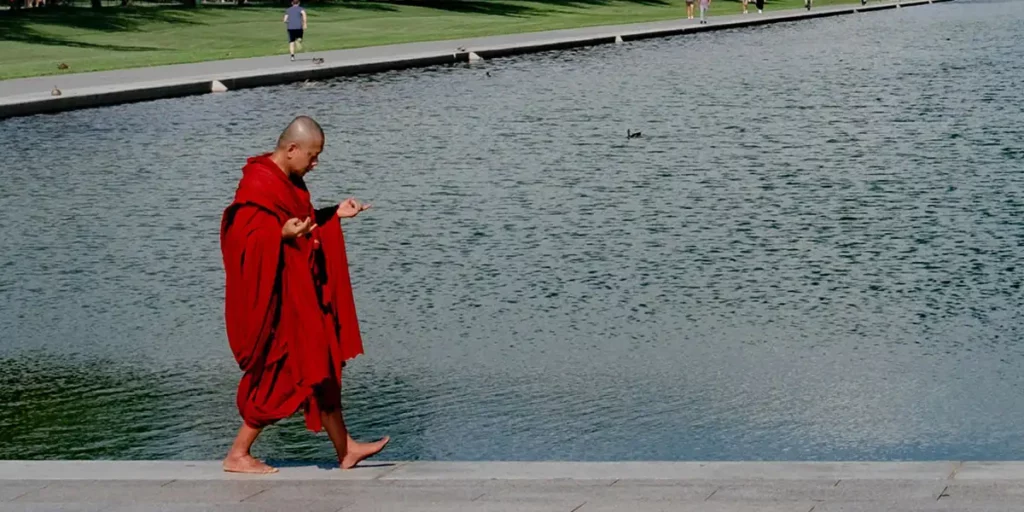Abiding Nowhere (Wu Suo Zhu) sees Tsai Ming-liang and Lee Kang-sheng return in an impressive continuation of the Walker series.
Tsai Ming-liang (Stray Dogs, Days) has never been one to follow the classical conventions of film, but even by his standards, the Walker series is a wholly different body of work. His tenth and latest addition, Abiding Nowhere (Wu Suo Zhu), is simultaneously a feature film, an art installation, and a social experiment. Lee Kang-sheng (Rebels of the Neon God), who has appeared in every one of Tsai’s films, returns as the titular walker, a monk with a shaved head clad in a long red robe. He walks extremely slowly, the world bustling around him, as Tsai’s camera holds steady and observes. This is undoubtedly challenging cinema—Tsai would surely be proud of this claim—but more importantly, it is meditative and vital, like a tonic for the soul.
Clocking in at 79 minutes, Abiding Nowhere is one of the longest entries in the Walker series. For a film constructed of lengthy scenes of around 5-10 minutes each and with no dialogue, it is impressive that Abiding Nowhere remains totally engrossing. Lee’s walker, who is inspired by a monk called Xuanzang who walked thousands of miles between China and India, is in Washington D.C. He carefully and determinedly walks through woods, over pavement, and through bustling public buildings, his eyes always cast down and hands held out in front of him.
Another man, played by Anong Houngheuangsy (Days), is also on the move throughout the city. He moves at a quicker pace, but still far from anything resembling being in a rush. In the contrast between the two men’s speed, Tsai finds deeper meaning but also humour. Lee’s walker exists almost in an alternate universe; whilst Anong’s character strolls through a couple of small buildings, the walker has only moved about a step, with Tsai cutting between the two meaningfully. Because of this varying pace, we have seconds with Anong and minutes with Lee, which urges us to look around more in the latter’s scenes, to drink in the environments.

It is a beautiful message that we could all use in real life. As the walker continues his slow trek through the streets, members of the public look on in amusement, confusion, or curiosity as they buzz around Lee on foot or on bikes or scooters. The constant rush of humans—we’ve all been guilty of thundering from destination to destination with little interest in our journey—is highlighted in full flow here, and in direct contrast to the walker. Lee is remarkable in Abiding Nowhere, the perfect vessel for a character of such great inspiration. Tsai’s longtime friend and collaborator has always been an actor who can say as much with his face and body as he can with words, but in Abiding Nowhere, his physical performance is taken to the next level. It is one of intense discipline and determination.
Challenging, yes, and definitely not for everyone, Abiding Nowhere highlights the strength and potential of slow cinema. Tsai directly invites us to partake in the deliberate act of patient viewing. The pace of Abiding Nowhere is something that takes time to get used to, but it will eventually only act as a salve for your soul whilst renewing your outlook on life and the surrounding world. Whether the walker’s journey ends with Abiding Nowhere or is set to continue in other lands remains to be seen; either way, the time Tsai has allowed us to spend with him so far is something to treasure.
Abiding Nowhere premiered at the 2024 Berlin Film Festival. Read our Berlin Film Festival reviews and our list of 20 films to watch at the Berlin Film Festival!

